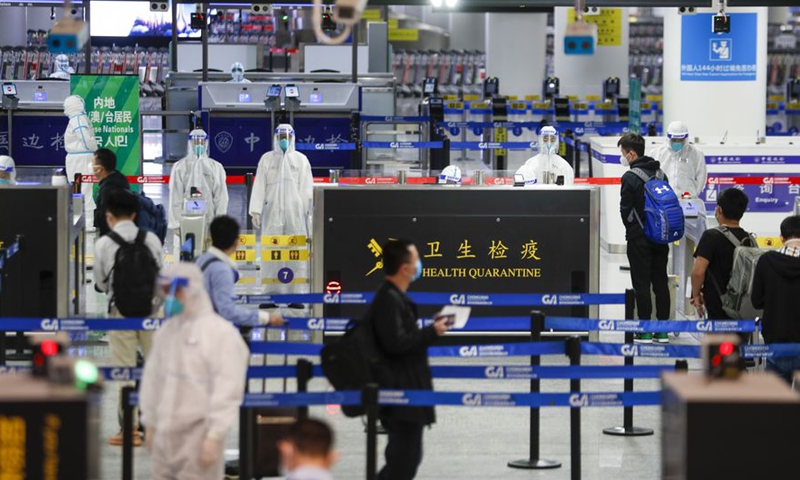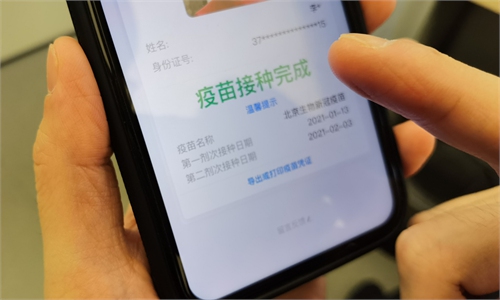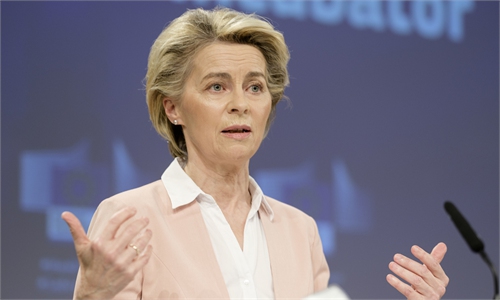
Staff members of the customs check the health declaration information of newly arrived inbound passengers in Chongqing, southwest China, March 29, 2020.File photo:Xinhua
As China has basically contained the virus and the speedy rolling out of vaccination in countries around the world is anticipated to help them control the epidemic, several Chinese lawmakers and political advisors said they will propose the issuance of digital vaccine travel certificates or "vaccine passports" in this year's two sessions to help people get life back to normal.
"China could encourage the public to voluntarily get vaccinated and gradually issue a new passport for those who have been vaccinated," Zhu Zhengfu, a prominent Chinese lawyer and a member of the National Committee of the Chinese People's Political Consultative Conference, told the Global Times on Tuesday.
Business and travel visas could be issued to people with vaccine passports if they want to go to countries and regions where the COVID-19 epidemic has been effectively curbed, Zhu said.
He also suggested that international arrivals could be exempted from the requirement of 14-day quarantine if they have a negative nucleic acid test report and the vaccine passport, while people in China can travel freely within the country free from nucleic acid testing if they have the vaccine passports.
Zhu also suggested the country promote the mutual recognition of the vaccine passports in the world, to boost international tourism and economic exchanges.
Zhu's proposal was echoed by Witman Hung Wai-man, a Hong Kong-based deputy to the National People's Congress, who suggested the central government set up a vaccine passport recognized by both the mainland and Hong Kong. With the passport, Hong Kong residents who have been vaccinated with domestic vaccines or foreign-produced vaccines recognized by China and have a negative nucleic acid test report will not need to get quarantined when they enter the mainland.
"I believe the passport will encourage more Hong Kong residents to get vaccinated, restart the exchanges between the city and the mainland and further help recover the economy," Hung said.
European Union leaders discussed the vaccine passport issue via a virtual meeting on Thursday and Friday to decide whether EU-wide travel would be allowed this summer. But they have not come up with a unified plan, as the leaders of the 27 countries were divided.
Despite the divergence, Iceland recently became the first country in Europe to issue and recognize COVID-19 vaccination certificates, which it hopes will allow vaccinated individuals to travel freely within its borders and abroad. Israel, the state of 9 million which has administered shots to half its population, also released a "green pass" a week ago to allow its holders to get exclusive access to gyms, hotels, theaters and concerts. The governments of Denmark and Sweden have also announced they will develop a vaccine passport to be launched before June.
Zeng Guang, the chief epidemiologist at the Chinese Center for Disease Control and Prevention, told the Global Times that the vaccine passport is worth promoting globally in the future to facilitate people-to-people exchanges and stimulate economic recovery.
But he said the globally recognized vaccine certificates should take consideration of the virus mutations to assess vaccines efficacy, and adjust the vaccines included in certificates according to the assessment.
Other Chinese health experts also shared their concerns over the EU's plan of vaccine passports, saying it would not be feasible scientifically at a time when emerging new variants of coronavirus raise doubts on the efficacy of vaccines.
Pan Helin, executive director of the digital economy research institute under the Zhongnan University of Economics and Law, told the Global Times on Tuesday that a vaccine passport is not feasible scientifically because it is hard for countries to reach common ground over the efficacy of different vaccines in a short time.
Instead, the expert suggested adopting a vaccine passport domestically to encourage people to take the initiative to receive vaccines.
Pan said there are also possibilities of illegal trade of vaccine passport in the market due to the lack of supervision.
From the economic point of view, the issuance of a vaccine passport will speed up population flow and benefit vaccine production and tourism, Pan said, adding that all these assumptions are based on the precondition that vaccine supply is sufficient.
International scientists have not figured out the real efficacy of vaccines amid virus variants, and it takes five to 10 years to find out the real efficacy, and how long vaccine protection can last also remains unknown, a Beijing-based immunologist who requested anonymity told the Global Times.
The immunologist believes at this stage, some countries' promotion of a vaccine passport is a purely political consideration, either for the purpose of promoting a vaccination campaign or economic recovery.




